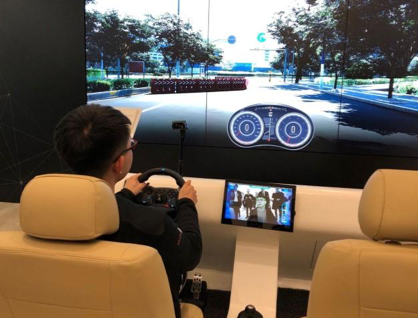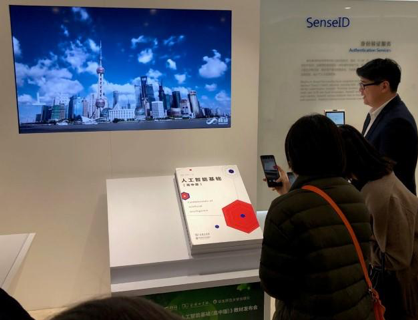By Florian Moeri, Junior Project Manager
On the evening of November 28, swissnex China hosted a joint lecture with nihub about the future impact of 5G and AIoT.
The numerous visitors were welcomed by Felix Moesner, Science Consul & CEO at swissnex China. He emphasized the importance of emerging technology and innovation, which are a major part of the efforts at swissnex. And, according to him, the future of 5G and AIoT in particular is already very near.
After the short introduction, Sergio Medyk, Product Line Manager at Nokia in China, held a presentation about 5G. This upcoming standard for mobile telecommunications service promises to be significantly faster than today's 4G technology.
To illustrate this dimension, Mr. Medyk needed the following comparison: With today's LTE technology (standard for wireless broadband communication), you can achieve a capacity of 1 GB per second. With the new 5G technology it is 10 GB per second. In addition, a much larger number of devices can be connected together. And it makes it possible to connect not only people but also things, for example robots in a factory. A keyword here - and this was often mentioned in the discussion - is "low latency". The processing of data between machine and network now works as fast as possible. This prevents accidents with automatic cars, for instance, through increased reactivity. The background is the transfer of frequency, which can be raised from 2 - 2.5 Gigahertz (LTE) to 3 - 5 Gigahertz (5G). "A physical principle: the better the frequency, the more data can be transported in less time" said Medyk.
The general structure of the network will also change: We are now trying to prioritize the various applications differently. That means “dividing the network”. Subsequently, factory machines that require low latency will be prioritized over mobile phone users, who will not experience any negative impact either way. Finally, what is important with 5G is that the network no longer runs in hardware, but in the cloud. This means that it is programmable for all conceivable purposes. And if you put AI, machine learning and 5G wireless connection together, you get a foretaste of what the future of the industry looks like. This brings us to the possibilities of mobile providers, where Nokia, for example, is taking action: offering 5G as a network which can connect not only people but everything to create new verticals that can produce new sources of revenues and new business models.
Mr. Madyk went on to show a number of use cases, e.g. a Smart airport, where a robot will soon guide passengers from the entrance to the check-in area and then to the boarding area. Or the influence of new technologies on education, also called Smart education, where remote teaching or lessons with preproduced content become possible. Or finally, the fundamental advantage of the so-called Fixed Wireless Access: a 5G Gateway, where with the new connection no more cables have to be laid. At the end of his presentation, Mr. Medyk mentioned which changes will come fastest according to him: “The first phase will be access and the second phase will be the industrial cases that become reality. For those interested in 5G and its possibilities, Nokia has developed the following public platform: https://open-ecosystem.org”.
After the basics of 5G were explained to us, Qian Hao, founder of Taro.AI spoke about the Artificial Intelligence of Things (AIoT). He did this, as well as the other speakers, in a very innovative way: he talked with a handheld microphone connected by a tracker to the tripod on which the mobile phone camera was placed. This product is an example of the product series of his company "Taro.AI": http://taro.ai.
In addition to this item they work with AI technology and transform spoken words into text. The vision is a search engine for keywords of a speech. Mr. Hao started by explaining his thoughts on the development of AIoT using keywords like "Great Company Originate from Great Episode (Big Changes). Great Episode Originate from New Dimension". He talked about the trends, included the last wave: the mobile Internet, where the key to the revolution was the "touch" factor (especially Apples iPhone display). He considers this wave as a big wave, because now it was possible to segment sources in marketing, whereas up to now 90 % has been done via TV advertising.
In contrast stands the small wave, AIoT. Small because it connects things rather than people. That's why it is especially interesting for the industry. And the technology of 5G will advance the technology of AIoT. The methodology, the distance and the service will adapt. According to Mr. Hao, in addition to the flow of people, money and things, a new dimension will emerge with the flow of robots. Every object will be connected. And with Blockchain there is even a payment method that could be used offline for selling 5G usage rights. The difficulties in rural areas and the correct handling of sensitive data will become a challenge when dealing with AIoT.
Next, Mr. Hao explained the characteristics of the interface between AIoT and 5G. Among there is the difficulty of localization in buildings, which is quite disrupted by walls and should therefore also be seen as a different scale than positioning outside. Another challenge is also the fact that in addition to the protagonist (e.g. the automatic car), its environment should also have low latency so that the technology works at its best. This is exactly where the big technology companies such as Huawei come in. In the course of the presentation, even the concept of the company as we know it was questioned, because in the future many things can be controlled centrally and remotely. Finally, the economic possibilities of the new technologies got mentioned. Focus here is not so much the already saturated market of applications, but the demand for control units: speakers and screens. Mr. Hao also made his personal prediction whereas he thinks that over the next 10 years, we will not offensively be connected but passively grabbed by the internet, especially by AIoT.
Sergio Medyk, Product Line Manager at Nokia in China, during his presentation about 5G.
Qian Hao, Founder of Taro.AI and in the foreground his "AI Cameraman".
It was at this aspect of potential new innovation and investment that Lucas Rondez, Founder and CEO of nihub, picked up with his speech. His company also believes in the "new waves" which is why they work with startups to create opportunities and develop new technologies. They do this through strong collaboration with VALID, a Brazilian technology provider. Together they co-organize an Acceleration Program in China: https://validaccelerator.com. This program supports 5 early-stage companies working in the field of 5G and AIoT and consists of at least three employees. In addition to a special focus on increased visibility, it is also possible to generate an investment - e.g. from VALID - in addition to cash prizes. The program thus helps companies to gain a foothold in the sector. Or as Mr. Rondez puts it: "The Accelerator creates an ecosystem where VALID & nihub share knowledge and resources to innovative startups & talents to create value for tomorrow".
This is exactly where the whole range of presentations were aimed at, showing us what the current status with 5G and AIoT looks like, what the future might bring and what challenges we will be facing along the way. We would like to thank all three speakers for their fantastic presentations and also those who participated in the subsequent discussions. We are looking forward to the next event!
Lucas Rondez, Founder and CEO of nihub, on the possibility of supporting start-ups.
From Left to Right: Sergio Medyk, Product Line Manager, Nokia; Qian Hao, Founder, Taro.AI; Lucas Rondez, Founder and CEO, nihub; Felix Moesner, Science Consul & CEO, swissnex China.




















